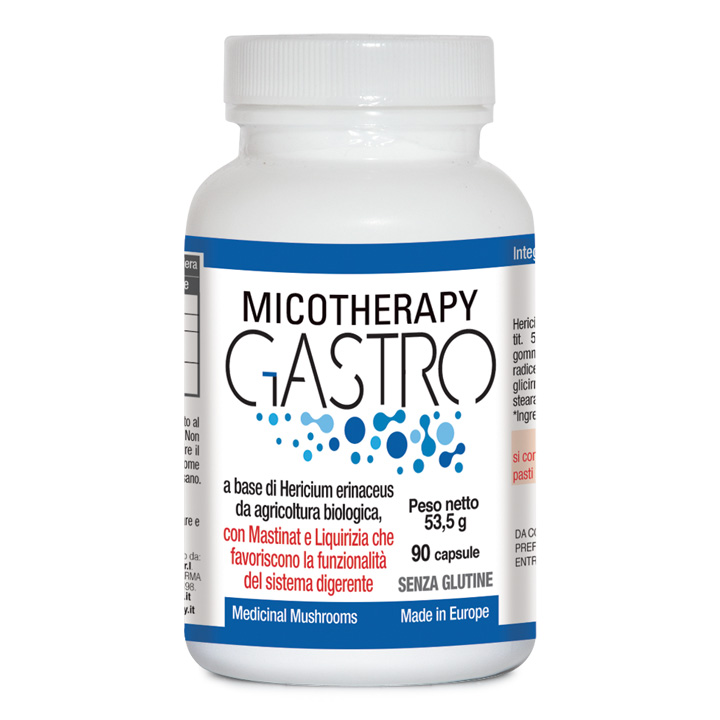
Gastric support
Micotherapy Gastro is a food supplement containing organically-grown Hericium erinaceus and plant extracts that promote digestive system function.
Health benefits:
Micotherapy Gastro is a formulation developed to improve the physiological functions of the gastrointestinal system, particularly in the presence of inflammatory situations.
Ingredients:
- Hericium erinaceus whole mushroom pulverised
- Mastinat (Pistacia lentiscus) dry extract
- DGL Liquorice dry extract (tit. at max. 2% in glycyrrhizic acid)
- Hericium erinaceus dry extract (titrated at 50% in polysaccharides)
PROPERTIES OF THE INGREDIENTS:
- Hericium erinaceus: commonly known as ‘Lion’s mane’, is traditionally used in the treatment of gastric conditions. By virtue of its anti-inflammatory and healing properties, it promotes the regeneration of the gastrointestinal mucosa and can be useful in inflammatory and infectious conditions involving the mucous membranes of the digestive tract.
- Mastinat dry extract is a resin produced by Pistacia lentiscus that boasts various properties. It is particularly useful for stomach complaints such as gastritis and ulcers and its antibacterial action also makes it ideal for Helicobacter pylori infections.
- DGL Liquorice: has anti-inflammatory, antispasmodic, healing and mucosal protective properties, making it useful in cases of gastro-oesophageal conditions such as stomach pain, heartburn and oesophageal reflux. Deglycyrrhizinated extract (max. 2% glycyrrhizic acid) brings the benefits of whole liquorice without the side effects of glycyrrhizic acid.
Directions:
2 capsules twice a day, before the main meals.
Pack:
pack containing 90 capsules
vegetable cellulose capsules
Notes:
Gluten free
No GMO
Made in Europe
| AVERAGE CONTENT OF CHARACTERISING INGREDIENTS | per daily dose (4 capsules) |
| Hericium erinaceus sporophorum | 800 mg |
| Pistacia lentiscus dry extract | 520 mg |
| DGL Liquorice dry extract | 450 mg |
| Maximum glycyrrhizic acid content | 9 mg |
| Hericium erinaceus dry extract | 200 mg |
| Polysaccharide content | 100 mg |
BIBLIOGRAPHY:
-
-
- Yang Yan, Yan Huifang, Lu Hongqi, Tang Qingjiu, Zhou Changyan, Bai Yunqin. A Study on the Protective Effect of Hericium erinaceus Extractions on the Stomachal Mucosa of the Rat. Acta Edulis Fungi 1999
- Mahmood Ameen Abdulla,Suzita Mohd Noor,Vikineswary Sabaratnam, Noorlidah Abdullah, Kah-Hui Wong, Hapipah Mohd Ali. Effect of Culinary-Medicinal Lion’s Mane Mushroom, Hericium erinaceus (Bull.: Fr.) Pers. (Aphyllophoromycetideae), on Ethanol-Induced Gastric Ulcers in Rats. Int.J.Med.Mushr. 2008, Volume 10 / Issue 4
- Huwez FU, Al-Habbal MJ. Mastic in treatment of benign gastric ulcers. Gastroenterol Japon 1986;21:273-4.?2. Al-Habbal MJ, Al-Habbal Z, Huwez FU. A double-blind controlled clinical trial of mastic and placebo in the treatment of duodenal ulcer
- J Clin Exp Pharm Physiol 1984;11:541-4.?3. Al-Said MS, Ageel AM, Parmar NS, Tariq M. Evaluation of mastic, a crude drug obtained from Pistacia lentiscus for gastric and duodenal anti- ulcer activity. J Ethnopharmacol 1986;15:271-8.?4
- Paraschos S, Magiatis P, Mitakou S, Petraki K, Kalliaropoulos A, Maragkoudakis P, Mentis A, Sgouras D, Skaltsounis AL. In vitro and in vivo activities of Chios mastic gum extracts and constituents against Helicobacter pylori. Antimicrob Agents Chemother. 2007 Feb;51(2):551-9. Epub 2006 Nov 20
- Dabos KJ, Sfika E, Vlatta LJ, Giannikopoulos G. The effect of mastic gum on Helicobacter pylori: a randomized pilot study. Phytomedicine. 2010 Mar;17(3-4):296-9. doi: 10.1016/j.phymed.2009.09.010. Epub 2009 Oct 29
- Konstantinos J KJ Dabos, Ekaterini E Sfika, Lisa J LJ Vlatta, Despoina D Frantzi, Georgios I GI Amygdalos, Georgios G Giannikopoulos. Is Chios mastic gum effective in the treatment of functional dyspepsia? A prospective randomised double-blind placebo controlled trial. J Ethnopharmacol 127(2):5 (2010),
- FU Huwez. Mastic Gum Kills Helicobacter pylori. N Engl J Med 1998; 339:1946 December 24, 1998
- Dimas SK, Pantazis P, Ramanujam R. Review: Chios Mastic Gum: A Plant-produced Resin Exhibiting Numerous Diverse Pharmaceutical and Biomedical Properties. In Vivo September-October 2012 26 (5) 777-785
- Wittschier N, Faller G, Hensel A. Aqueous extracts and polysaccharides from Liquorice roots (Glycyrrhiza glabra L.) inhibit adhesion of Helicobacter pylori to human gastric mucose. Journal of Ethnopharmacology. Volume 125, Issue 2, 7 September 2009, Pages 218–223
- R. Dehpour, M. E. Zolfaghari, T. Samadian, Y. Vahedi. The protective effect of liquorice components and their derivatives against gastric ulcer induced by aspirin in rats. Journal of Pharmacy and Pharmacology. Volume 46, Issue 2, pages 148–149, February 1994
- Reese WD, Rhodes J, Wright JE, Stamford LF, Bennet A. Effect of deglycyrrhinated liquorice on gastric mucosal damage by aspirin. Scand.J.Gastroenterol. 1979; 14(5):605-607
- Krausse R, Bielenberg J, Blaschek W, Ullman U. In vitro anti-Helicobacter pylori activity of Extractum liquiritiae, glycyrrhizin and its metabolites. Journal ofAntimicrobial Chemotherapy. Volume 54, Issue 1. Pp. 243-246
- Fukai T, Marumo A, Kaiyou K, Kanda T, TeradaS, Nomura T. Anti-Helicobacter pylori flavonoids from licorice extracts.Life Sci. 2002 Aug 9;71 (12):1449-63
-



